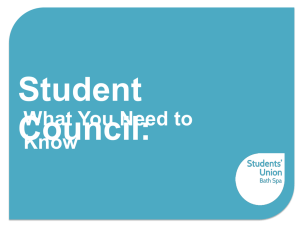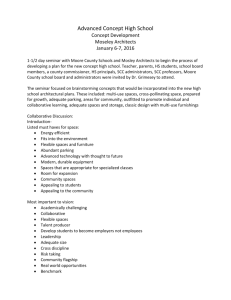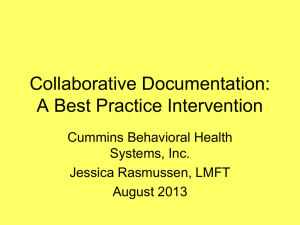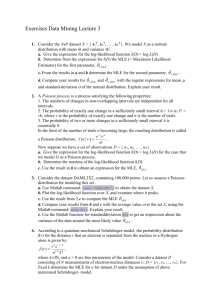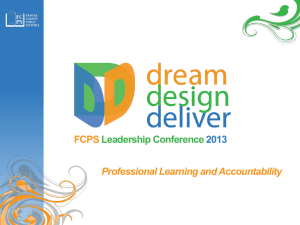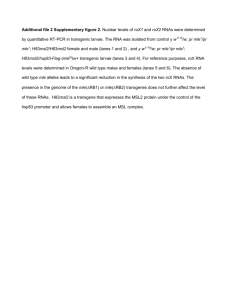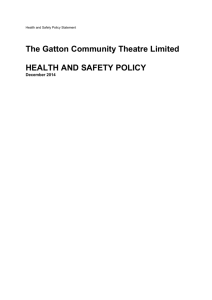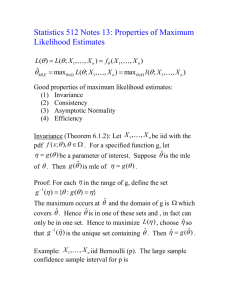Document
advertisement
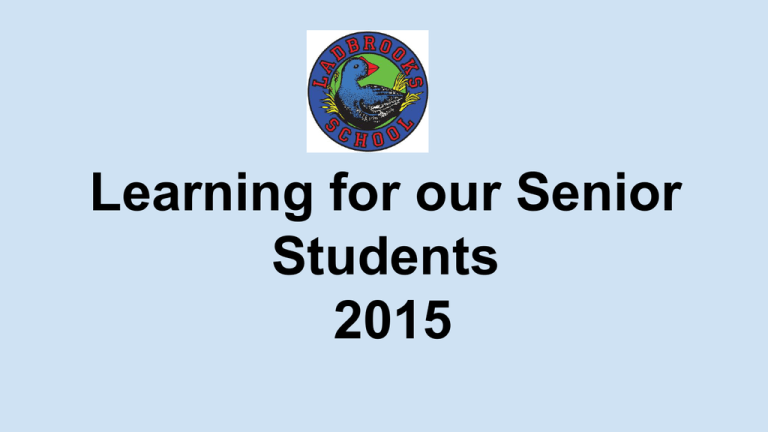
Learning for our Senior Students 2015 Admin ● Acknowledgement ● Purpose of the meeting tonight ● What is ‘true’ consultation ● The ‘pit’ of learning The future of learning at Ladbrooks School and beyond …. ● Ladbrooks is a great school. What does this mean? ● How and why is learning changing? http://www.ted.com/talks/ken_robinson_changing_education_paradigms ● How have we been addressing the 21st C needs of our students? ● How are these needs being reflected strategically by our Board of Trustees? ● What are our local cluster schools doing? ● The Ministry of Education’s stance? ● Greater connectivity. We have introduced the term ‘ubiquity’ (learning anytime and anywhere) ● We are continuing to develop new skills and literacies with our students ● Making learning personalised ● The use of physical and virtual learning spaces ● Allowing learning to be student centered: Experiential ● Ongoing opportunities for our students to explore their creative talents ● Catering for student’s different learning styles Strategic Planning from the Board of Trustees Strategic Area 1: Provide meaningful opportunities. ● Innovative ways to blend ICT and e-Learning into our teaching and learning programmes. Strategic Area 2: Creating purposeful learning environments. ● Continue to develop our understanding of teaching and learning in the 21st Century. Strategic Area 3: Connecting with our Community. ● Continue to work effectively with our community around learning in the 21stC (MLE, collaboration, digital technologies, inclusive practices). Strategic Area 4: Preparing our school for the future. ● ● Research and plan for future development at Ladbrooks School. Create fundraising opportunities to enrich resourcing at Ladbrooks School. Strategic Area 5: Pursuing High Standards. ● Explore and develop programmes that cater for our GATE (Gifted and Talented) students. Current Context: What does teaching and learning look like in our Senior classrooms? ● ● Flexible working space Independence, choice of working space to fit needs. Working collaboratively with their peers From what we have seen, read, heard over the last year what could be happening? Hingaia Peninsula School. They operate a year 4-8 system in their school http://vimeo.com/60784481 Principal Jane Danielson: “No glass ceiling or floor, it’s just part of the teaching and learning of the learning community” - The learning is not segregated to ‘a level’ (stage), it is fluid depending on the needs of the learner. “We can’t segregate because of shoe size” Clarkville Primary visit Photos: Interesting observations: Workshops - chosen through assessment and solo taxonomy self assessment. Classroom timetable - weekly programme. Literacy, numeracy, SRL, teaching time to class, groups? Features of a Senior Learning Community at Ladbrooks School …. ● ● ● ● ● ● ● ● Student Learning from and with one another. Not always coming from the teacher. Grouping according to ‘levels’ not ages. Teachers are able to truly combine classes and arrange learning according to student needs and interest. The spaces used in a Learning Community depend on the learning needs at the time i.e independent, small group, large group. Our current spaces do not lend themselves well to this way of learning. Create enriching collaborative environments Enriching action stations, targeted teaching Develop an active learning culture, enable the curiosity of the students and teachers 1 teacher working on particular workshops in one room, other room: action learning room, guiding students with their learning, learning pathways that individualise the learning for each student Aspects of collaboration have always existed in primary schools - interchange, cross-grouping, buddy systems So ...How do we know that collaboration in a Modern Learning Environment actually improves student outcomes and raises achievement? Socially constructed learning (Johnson, 1981): the collaboration, peer-tutoring and reciprocal teaching that occurs when students work together results in a deeper understanding of the material being covered. Integration within subjects has been happening for years within schools, Research states that the most powerful effect on student learning and achievement is the teacher. As you put teachers together the power increases. The more teachers the more power. Collaborative learning teams are said to attain higher level thinking and preserve information for longer times than students working individually. Why is this so? Groups tend to learn through “discussion, clarification of ideas, and evaluation of other’s ideas.” Perhaps information that is discussed is retained in long term memory. Research by Webb suggests that students who worked collaboratively on math computational problems earned significantly higher scores than those who worked alone. Plus, students who demonstrated lower levels of achievement improved when working in diverse groups. Collaborative learning teams are said to attain higher level thinking and preserve information for longer times than students working individually. Structuring the Senior School in 2015 Option 1: A Year 4-6 team in Kiwi and Year 6-8 team in Kereru. Teams remain separate with some areas of collaboration. If this option goes ahead both teams would remain in single cell classrooms in 2015. No Ministry of Education Modern Learning Environment upgrades would take place in the immediate future. Option 2: A Year 4-8 ‘area’ of the school. Joining together at times for collaboration throughout the day, week, term. If this option goes ahead both teams would learn in a ‘state of the art’ teaching and learning space in the Tui and Kiwi part of the school. This area would be designed to allow the Year 7 & 8’s to be independent when necessary, however flexible enough to collaborate with others when needed. If this is the option the year would begin in the existing Tui and Kiwi spaces. The students would move through to Ruru and Kereru when it was time for construction to take place. Year 7 & 8 : Leadership, Careers Day, Technology at Lincoln Primary, William Pike Challenge Award, Chinese Language Learning. Time for your thinking! Yellow and Black Hat Activity Q&A ● ● ● ● ● ● ● ● How do the senior students get used to the transitions of high school? Lincoln HS has already begun to work with MLE as there is an expectation that all schools in NZ will have transitioned to MLE by 2020 How can we help students from losing self esteem if they are grouped with younger students in reading/writing/maths groups? Students know if they are struggling and the importance is on their learning needs. We also have to celebrate the fact that a younger student is working above the expected level in an area. We also realise that one student may not understand something explained by one teacher, but clicks when explained by another teacher or student, a great example of collaborative teaching. Even in a single cell class there can be a very wide academic spread. Students naturally move to work with others who are at the same level as them. Children are likely to be grouped according to their ability. In saying that, knowing our students as individuals, we understand that this may not be the best approach for all students. We can group according to individual needs as well as abilities. How will we maintain a valid relationship with the parents? “The learning community teacher” will always be the first port of call. Your Questions …. Proposed Timeline (Draft): Week 3 Consult with a group of year 4 parents whose children may be moving to the Senior School in 2014. Week 4 Stage 1: Senior School Consultation Stage 2: Survey to go out (TBC) Week 5 Collect & analyse responses from stakeholders. Week 6 Collect & analyse responses from stakeholders.Staff and Board of Trustees to review responses. Board of Trustees meet to discuss. Week 7 Decision made and communicated on Senior School structure for 2015. Week 8 Meet with Year 6 parents if Year 4-8 ‘area’ of the school does not go ahead. From here ……. ● We encourage you to go away and have a think about the information we have presented tonight. ● This week we are going to send you out a short survey to give you the opportunity to give us feedback. ● This presentation will be uploaded to the school website, so you can access it and refer back to the points we have talked about tonight.



